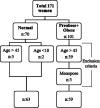The effect of ruminative thoughts on sexuality in obese women
- PMID: 38196457
- PMCID: PMC10772421
- DOI: 10.12669/pjms.40.1.8625
The effect of ruminative thoughts on sexuality in obese women
Abstract
Objectives: Ruminative thoughts play a significant role in the pathogenesis of disorders such as anxiety and depression. This study was conducted to investigate the impact of ruminative thoughts on the sexual functions of obese and non-obese women.
Methods: This case-control study included individuals sexually active women aged 18 and above, and under 46 years, who applied to the university hospital's obesity clinic in 2021 and had not previously been diagnosed with the patient and/or their partner with organic and/or psychiatric diseases that could cause sexual dysfunction and/or being under treatment, as well as pregnancy. The participants consisted of pre-obese and obese individuals (n = 59), as well as non-obese individuals (n = 63). The Ruminative Thought Style Questionnaire, Female Sexual Function Index, and Arizona Sexual Experiences Scale were administered to the voluntary participants. Using univariate and multivariate statistical models, the effects of obesity and volatile thought styles on the sexual experiences of obese and non-obese women were evaluated.
Results: The analyses conducted revealed that the scores of ruminative thoughts were not affected by obesity. After adjusting for age, it was observed that Arizona Sexual Experiences Scale scores were higher in pre-obese and obese women (p<0.05). In the multiple models created, Arizona Sexual Experiences Scale scores were negatively influenced by obesity, whereas Female Sexual Function Index scores were adversely affected by ruminative thought styles.
Conclusions: In this study, while addressing sexual health for both preobese, obese, and non-obese women, the importance of considering predisposing psychological factors is emphasized. It emphasizes the importance of ruminative thoughts and obesity on sexual functioning in women. Psychological well-being and body image perception emerge as critical elements in this relationship.
Keywords: Obesity; Ruminative thoughts; Sexuality.
Copyright: © Pakistan Journal of Medical Sciences.
Conflict of interest statement
Conflicts of interest: None.
Similar articles
-
The Relationship Between Psychological Resilience, Ruminative Thoughts, and Spiritual Well-Being of Individuals Diagnosed With Cancer: Descriptive and Correlational Research.J Clin Nurs. 2025 Apr 28. doi: 10.1111/jocn.17780. Online ahead of print. J Clin Nurs. 2025. PMID: 40296463
-
Association Between Body Mass Index and Female Sexual Dysfunction: A Cross-sectional Study from the Data Registry on Experiences of Aging, Menopause, and Sexuality.J Sex Med. 2020 Oct;17(10):1971-1980. doi: 10.1016/j.jsxm.2020.07.004. Epub 2020 Aug 6. J Sex Med. 2020. PMID: 32771351 Free PMC article.
-
Sexual functioning, sexual esteem, genital self-image and psychological and relational functioning in women with Mayer-Rokitansky-Küster-Hauser syndrome: a case-control study.Hum Reprod. 2019 Sep 29;34(9):1661-1673. doi: 10.1093/humrep/dez130. Hum Reprod. 2019. PMID: 31418785
-
Sexual satisfaction in the elderly female population: A special focus on women with gynecologic pathology.Maturitas. 2011 Nov;70(3):210-5. doi: 10.1016/j.maturitas.2011.07.015. Epub 2011 Sep 22. Maturitas. 2011. PMID: 21943557 Free PMC article. Review.
-
How Well Do Measurement Scales Reflect the Actual Experience of Sexuality in Mid-Life and Beyond?Sex Med Rev. 2019 Jan;7(1):29-45. doi: 10.1016/j.sxmr.2018.04.004. Epub 2018 Jul 26. Sex Med Rev. 2019. PMID: 30057138
References
-
- Berman LA, Berman J, Miles M, Pollets DAN, Powell JA. Genital self-image as a component of sexual health:Relationship between genital self-image, female sexual function, and quality of life measures. J Sex Marital Ther. 2003;29(Suppl-1):11–21. doi:10.1080/713847124. - PubMed
-
- Graziottin A, Leiblum SR. Biological and psychosocial pathophysiology of female sexual dysfunction during the menopausal transition. J Sex Med. 2005;2(Supplement-3):133–145. doi:10.1111/j.1743-6109.2005.00129.x. - PubMed
-
- Moss NE. Gender equity and socioeconomic inequality:a framework for the patterning of women's health. Soc Sci Med. 2002;54(5):649–661. doi:10.1016/s0277-9536(01)00115-0. - PubMed
-
- Segerstrom SC, Tsao JC, Alden LE, Craske MG. Worry and rumination:Repetitive thought as a concomitant and predictor of negative mood. Cogn Ther Res. 2000;24:671–688. doi:10.1023/A:1005587311498.
LinkOut - more resources
Full Text Sources

